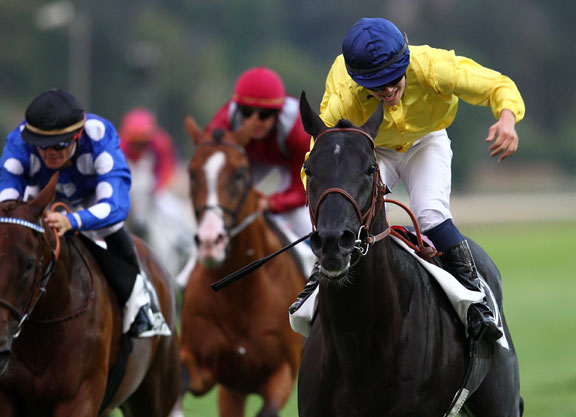From Mar. 1, female riders in France will receive a 2kg (4.4 pound) allowance in most races, with the aim of the new rule being to boost trainers' and owners' confidence in women jockeys, enabling them to become more competitive.
The board of directors of France Galop reached this decision only last Monday, but France Galop's President Edouard de Rothschild has been considering the move for a long time.
Training yards in France have become more and more feminine in recent years. According to France Galop, one-sixth of professional jockeys are women but they ride much less frequently than their male counterparts. For nearly 15 years, 60% of the pupils at Afasec, the French racing school, have been female. Women now account for a third of the workforce in racing, twice as many as 20 years ago, and that creeps up to 50% among the under 20s.
Yet only one group race has been won by a woman in France to date, when Amelie Foulon landed the G3 Grand Prix de Vichy aboard Elliptique (Ire) (New Approach {Ire}) for trainer Andre Fabre and owner Edouard de Rothschild.
It is difficult to assess how popular this allowance will be until it is put into practice. The first reactions, coming from both sides of the English Channel, reveal a certain level of scepticism. Hayley Turner was quoted in the Racing Post as saying, “The girls in France will be rubbing their hands together.”
A multiple Group 1-winning jockey, Turner also stated that it was thanks to intensive work experience in the United States that she had acquired the necessary stamina and strength to compete on equal terms with the boys.
It could be said that French trainers are less open to the idea of female jockeys than their British or American counterparts, and that a stronger glass ceiling separates training from competition in France for women. This new step is intended to fracture that ceiling.
Among the more negative reactions in Great Britain, the argument has been put forward that women are as strong as men in the races and that this rule therefore constitutes an offence to their equality. However, the positive discrimination applied to give opportunities to certain minorities does not mean that these minorities are less able than the others, merely that they may suffer from prejudices which must be countered. This is clearly the example that France Galop wanted to follow with this rule.
It was also noted that, as Class 1 contests, listed races and group races are not affected by this allowance, then it would in fact be ineffective. However, applying the rule to pattern races was impossible. Group and listed races are selected on a European-wide basis and France cannot impose specific rules on its own.
The French Association of Jockeys did not officially react to the news, but its president Jacques Ricou said, “I think it is above all a question of mentality. Some women have risen to the highest level against men and they have succeeded, like Beatrice Marie, Anne-Sophie Madelaine or Barbara Genet and Nathalie Dessouter today. They all have in common the fact that they have been supported by great trainers and owners. What women jockeys lack is the confidence of horsemen, which would allow them to be used more.”
“It should also be noted that raw strength is more decisive over the flat than over jumps, where the experience and sensitivity matter more,” Ricou added. “In flat racing, it is mainly a question of explosiveness, and one can compare the performance of a flat jockey to that of a sprinter. That is the real difference between men and women, which women can sometimes compensate by other qualities, but not usually when it comes to pushing a horse to the line. We are tackling prejudice, perhaps also to give ourselves a good conscience, and we will have to judge the results then maybe adjust the rule in a few years.”
Nicolas Caullery, who has just won his first race in Dubai and finished the last year in 22nd place among the French trainers, with 48 victories and more than €1.5-million in prize-money, comments, “It will be necessary to follow the results, and the influence of this rule on trainers' decisions. For my part, I have my apprentices and I will continue to trust them first. I do not think it will change my habits. I happen to give rides to women jockeys, but it has nothing to do with their gender.”
Caullery's partner, Marine Henry, is also a trainer, and her reaction is more positive. She says, “It is a very good initiative. The strength of a man is greater than that of a woman, and that counts a lot in a race. I also think this rule is less sexist than women-only races.”
Not a subscriber? Click here to sign up for the daily PDF or alerts.






